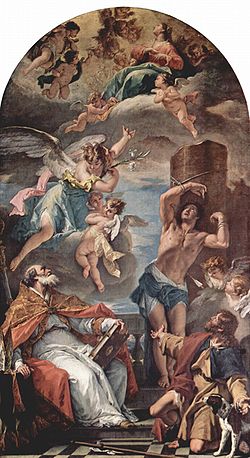
Saint Eusebius of Vercelli
Dear Brothers and Sisters,
This morning I invite you to reflect on St Eusebius of Vercelli, the first Bishop of Northern Italy of whom we have reliable information. Born in Sardinia at the beginning of the fourth century, he moved to Rome with his family at a tender age. Later, he was instituted lector: he thus came to belong to the clergy of the city at a time when the Church was seriously troubled by the Arian heresy. The high esteem that developed around Eusebius explains his election in 345 A.D. to the Episcopal See of Vercelli. The new Bishop immediately began an intense process of evangelization in a region that was still largely pagan, especially in rural areas. Inspired by St Athanasius – who had written the Life of St Anthony, the father of monasticism in the East – he founded a priestly community in Vercelli that resembled a monastic community. This coenobium impressed upon the clergy of Northern Italy a significant hallmark of apostolic holiness and inspired important episcopal figures such as Limenius and Honoratus, successors of Eusebius in Vercelli, Gaudentius in Novara, Exuperantius in Tortona, Eustasius in Aosta, Eulogius in Ivrea and Maximus in Turin, all venerated by the Church as saints.
With his sound formation in the Nicene faith, Eusebius did his utmost to defend the full divinity of Jesus Christ, defined by the Nicene Creed as “of one being with the Father”. To this end, he allied himself with the great Fathers of the fourth century – especially St Athanasius, the standard bearer of Nicene orthodoxy – against the philo-Arian policies of the Emperor. For the Emperor, the simpler Arian faith appeared politically more useful as the ideology of the Empire. For him it was not truth that counted but rather political opportunism: he wanted to exploit religion as the bond of unity for the Empire. But these great Fathers resisted him, defending the truth against political expediency.
Eusebius was consequently condemned to exile, as were so many other Bishops of the East and West: such as Athanasius himself, Hilary of Poitiers – of whom we spoke last time – and Hosius of Cordoba. In Scythopolis, Palestine, to which he was exiled between 355 and 360, Eusebius wrote a marvellous account of his life.
(To continue reading, please click here).
